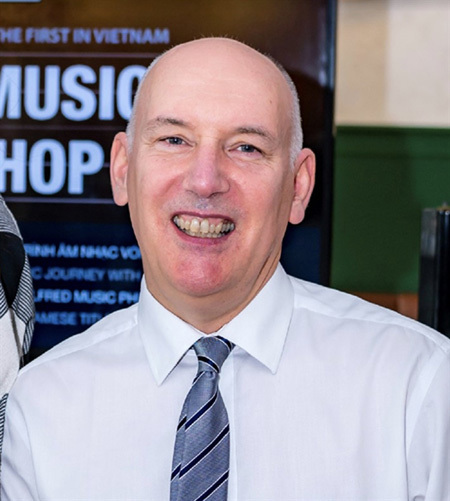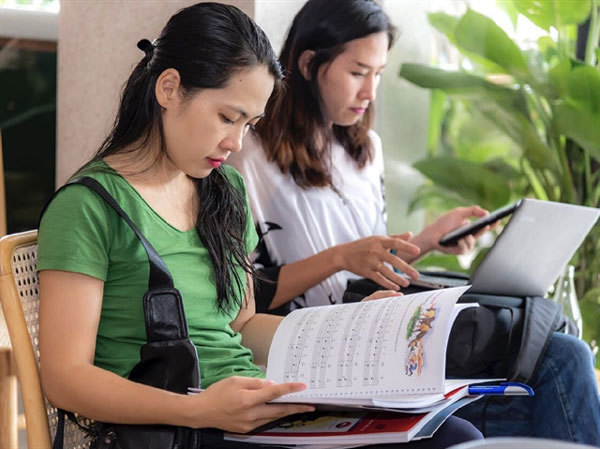Children's books released for summer holiday
Bilingual book of childhood stories launched
Library opens free reading room for young readers
 |
| Andrew Higgins of Alfred Music publishing company. |
Alfred Music, the world's leading music publisher, recently decided to distribute its books in Vietnam. VNS talks with Andrew Higgins, a member of the music publication Alfred Music, about bringing music to all Vietnamese.
You publish music books in many countries. Why did you decide to come to Vietnam?
Alfred Music already has a strong presence in Southeast Asia and China. Now is the right time to bring good music teaching and appreciation to Vietnam because the country is developing very quickly.
One of the reasons that inspired AMPA Education’s decision to translate and introduce Alfred Music books to Vietnam is the desire to give more Vietnamese children greater access to quality music books so they can have more opportunity to discover, learn and practise their first musical steps.
As these books are locally produced, they are a fraction of the cost of imported books and are considerably more affordable for families in the country.
Music and education have a correlation. If there is music in children’s life, they will study better. In a developing country, normally much emphasis is given to the sciences and engineering, and the arts and music are often put in second place. As you know, Vietnam is moving very fast and music will catch up very fast too. There’s a lot of potential for music and the arts to grow in Vietnam. Now is the right time and the right place.
Alfred Music held a workshop with teachers and people who are studying music in Vietnam. I was pleased to demonstrate the values we represent as one of the world’s leading educational publishers. Everyone was really supportive of the idea to bring professional music education publications to this small but potentially vibrant market. This is a real challenge for AMPA Education.
Its attempt to bring and distribute these music education publications in Vietnam shows real courage, willingness and commitment. And as a representative of Alfred Publishing, I support, applaud and admire your vision.
 |
| Readers look at a music book at a book launching event in HCM City. — VNS Photo |
Alfred Music has published music books for dozens of years for over 10 million people around the world. Can you tell us about the different kinds of books you publish?
Alfred Music currently has over 150,000 active titles in nearly every music discipline and represents a wide range of well-known publications, from methods like Alfred’s Basic Guitar, Alfred’s
Basic Piano Library, Premier Piano Course, Sound Innovations and Suzuki, to artists like Bruce Springsteen, Bruno Mars, Cole Porter, Carrie Underwood, Garth Brooks, Jimmy Buffett, George and Ira Gershwin, John Lennon, Katy Perry, Led Zeppelin, The Rolling Stones and The Who, to brands like Harry Potter, Lord of the Rings, Star Wars, The Wizard of Oz, Rolling Stone magazine and Billboard.
Alfred Music is now also paired with MakeMusic, which is part of the Peaksware Holdings LLC portfolio of companies, to transform how music is composed, published, taught, learned and performed by bringing together leaders in educational music publishing and music technology.
How do you see the correlation between music and education? Do you think this connection has been developed well around the world and in developing countries like Vietnam? What do you think schools in Vietnam should do to speed up or strengthen the connection between music and education?
Music is quite unique as a subject because it accesses all parts of the brain (creative and rational). Furthermore, it demands a level of physical control and an ability to concentrate on detail for sustained periods. Any child who acquires these skills will excel at anything they choose to do.
It is always important to have good books with good content for purposes of education. Music is no exception. Although it is possible to translate the teaching instructions in some good music books into Vietnamese, it is not possible to do this for all the books because there are so many of them. We can increase the range of good quality music books in Vietnam if we can select and import some of these good books into the country to make them available here. From this, you can identify what imported books are suitable for Vietnam so you can consider translating them for the wider market here.
As a music publisher, what advice would you give to increase Vietnamese children's access to music education?
More quality teachers trained to the highest standards. They can work in small music schools around the country but be unified by a common organisation like a music teaching association. This association could collaborate with related NGOs to lobby the Government for additional funds to support music education in the community.
Having quality music books is important, but how should learners apply theory to practice?
All Alfred courses correlate theory and practical knowledge. When a student plays scales, they learn to write them, too: chord progressions are played and written simultaneously, with each lesson and theory book moving at the same pace. If a student does not match theory with practice, then they may play some pieces well, but they will simply be following instructions not developing a musical mind. It is this that needs to be fostered for true creativity. In the end, we want students to play music (practice) on their own terms, so we must ensure they understand how music works (theory) and then they can demonstrate that knowledge in how well they play or teach.
What do you think about books that are not authentic? What should we do to encourage people to use authentic books?
As a publisher it is clear. We invest in the creation of books and content. This creation comes at a cost, and it is reasonable to expect users of content to contribute to the cost and create some additional revenue through purchasing, so publishers can commission more content. Inauthentic books often appear in nascent markets where there are no regular suppliers and no distribution. Creating suppliers and distributors and developing a local pricing strategy will start a process whereby legitimate content is available at good prices.
Illegality may still exist, but over time the value of authenticity will limit this. A useful step is to modestly discount teacher purchases (10 per cent), so that when they sell to their students’ parents they can sell at full price and gain a little extra revenue for the time and trouble they take on the parents’ behalf. This way, teachers may be incentivised to help "legalise" purchasing.
VNS
 The children’s book market has been developing strongly in Vietnam, with many books coming from foreign countries. However, music books are rarely found at bookstores, with only about 500 titles. " itemprop="description" />
The children’s book market has been developing strongly in Vietnam, with many books coming from foreign countries. However, music books are rarely found at bookstores, with only about 500 titles. " itemprop="description" />